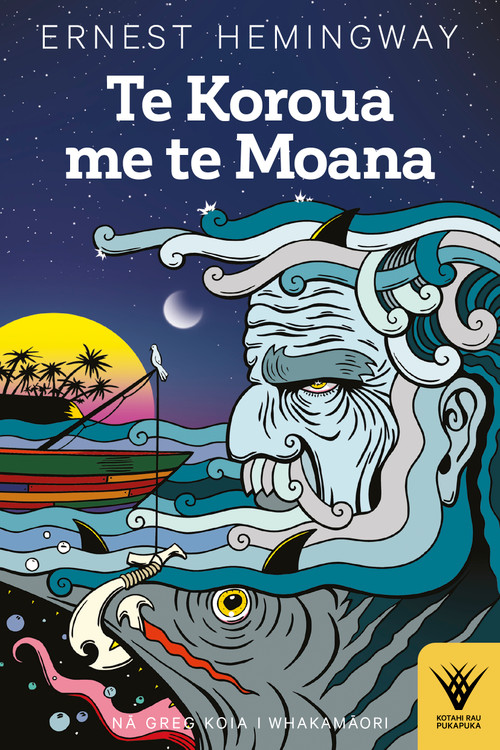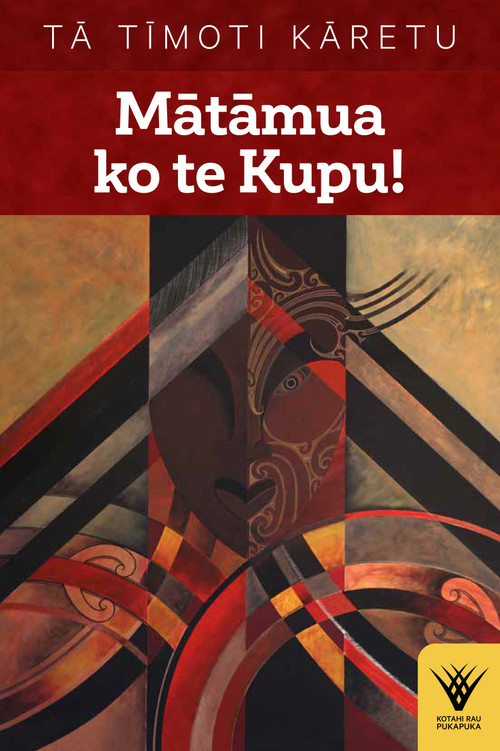
Te Ruānuku
Paulo Coelho. Nā Hēmi Kelly i whakamāori
Kua whakamāorihia tā Paulo Coelho pukapuka whakaaweawe, e kaha nei hoki te hokona puta noa i te ao, ā, koinei te pukapuka nui katoa te whakawhitihia ki reo kē nā tētahi kaituhi e ora tonu ana.
He pūrākau whakamīharo te pukapuka a Paulo Coelho mō Hanatiāko, mō tētahi taitama hēpara nō Anarūhia e kōingo ana ki te hāereere ki te kimi i ngā kura huna o te ao. I roto i tana haerenga, ka kite ia i ētahi kura tino rerekē nei i tāna i pohewa ai e ea ai tana kōingo. Ka whakaako mai Te Ruānuku i te pūmanawa o te whakarongo ki ō tātou ngākau, o te kite i ngā huarahi, o te ako hoki ki te whakamāori i ngā tohu ka puta mai i te wā o te ora me te akoranga nui katoa o te whai i ō tātou moemoeā.
Nuku atu i te 85 miriona ngā pukapuka kua hokona puta noa i te ao, ā, he nui ake hoki te whakawhitihia o te pukapuka nei ki reo kē i tō ētahi atu pukapuka nā tētahi kaituhi e ora tonu ana. Kua noho mai a Te Ruānuku hei pukapuka e kore nei e herea e te wā, pēnei i te reo Māori e newanewa nei tōna rere i roto i tēnei whakamāoritanga nā Hēmi Kelly.
Paulo Coelho’s inspirational global bestseller now available in te reo Māori.
Paulo Coelho’s masterpiece tells the mystical story of Santiago, an Andalusian shepherd boy who yearns to travel in search of a worldly treasure. His quest will lead him to riches far different – and far more satisfying – than he ever imagined. The Alchemist teaches us about the essential wisdom of listening to our hearts, of recognising opportunity and learning to read the omens strewn along life’s path. And, most importantly, to follow our dreams.
With over 85 million copies sold around the world and translated into more languages than any other book by a living author, The Alchemist has established itself as a modern classic, now brilliantly translated into te reo Māori by Hēmi Kelly.
Te Kaituhi / Author
Nō te tau 1947 i whānau mai ai te kaituhi nō Parīhi, a Paulo Coelho, i Rio de Janeiro. He kaiwhakaari, he kaiwhakatangitangi hoki ia i mua, ā, nō te ekenga ōna ki te toru tekau mā iwa ka arahina ia ki tāna mahi hei kaituhi i tētahi haerenga tapu i te ara o Camino de Santiago. Nā te iti o te hokona o tana pukapuka tuatahi, o The Alchemist, i whakatau ai tana kaiwhakaputa ki te whakarere i te pakimaero nei. Engari i nui ake te paingia o tā Coelho mahi e ngā kaipānui i roto i te wā, ā, nāwai rā ka puta mai hei pukapuka kaha nei te hokona i te ao katoa. Nuku atu i te 230 miriona ngā pukapuka a Paulo Coelho kua hokona puta noa i te ao, ā, nuku atu i te 427 wiki e kitea ana ia i tā te New York Times rārangi o ngā pukapuka e kaha nei te hokona. Huri i te ao, kua whakawhitihia āna pukapuka ki ngā reo e 82, ā, kua whakaputahia i ngā whenua 170. Hei tā Kenzaburō Ōe, hei tā te toa i te Nobel Prize in Literature, ‘Kei te mōhio a Paulo Coelho ki te kura huna o te toiwhitiiho ā-tuhituhi.’
________
Born in Rio de Janeiro in 1947, the Brazilian author Paulo Coelho was an actor and rock musician until, at thirty-nine, a pilgrimage on the Camino de Santiago led him to begin his life as a writer. Slow initial sales of his second book, The Alchemist, convinced his publisher to drop the novel, but Coelho’s masterpiece grew with readers over time to become a huge global bestseller. Paulo Coelho’s books have now sold more than 230 million copies worldwide and have been on the New York Times bestseller list for more than 427 consecutive weeks. Around the world, they have been translated into eighty-two languages and published in 170 countries. As Kenzaburō Ōe, winner of the Nobel Prize in Literature commented, ‘Paulo Coelho knows the secret of literary Alchemy.’
Te Kaiwhakamāori / Translator
He uri a Hēmi Kelly nō Ngāti Maniapoto me Ngāti Tāhu-Ngāti Whāoa. I tīmata tana whai i te reo Māori nōna e taiohi tonu ana, ināianei kua tū ia hei kaiako reo Māori. Kei Te Wānanga Aronui o Tāmaki Makaurau ia e mahi ana. E pā ana te nuinga o āna mahi ki te whakarauoratanga o te reo Māori me te kaupapa o te whakamāori kōrero.
He ika a Whiro a Hēmi nō Te Panekiretanga o Te Reo, kua whakawhiwhia hoki ia ki te Toi Reo Māori, arā ki te tohu kaiwhakamāori. I te tau 2017, i whakamāoritia e Hēmi tā Witi Ihimaera pukapuka ko Sleeps Standing. Ka whakaputaina tāna ake pukapuka tuatahi ko A Māori Word a Day i te tau 2018, ā, i muri iho i tērā ka puta ko A Māori Phrase a Day. Ko tāna tuhinga auaha tuatahi i tuhia ai ki te reo Pākehā kei roto i te pukapuka o Pūrākau – he kohinga pūrākau Māori nā ētahi kaituhi Māori.Ka waiho mai ko Te Ruānuku hei pukapuka tuarua kua whakamāoritia nei e Hēmi.
________
Hēmi Kelly is of Ngāti Maniapoto and Ngāti Tāhu-Ngāti Whāoa descent. He started learning te reo Māori as a young teenager and naturally progressed into teaching roles after study. Hēmi is a full-time lecturer in te reo Māori at the Auckland University of Technology. His academic research and writing focus largely on the revitalisation of the Māori language and translation studies.
Hēmi is a licensed translator and graduate of Te Panekiretanga o Te Reo (The Institute of Excellence in the Māori Language). In 2017, Hēmi translated Witi Ihimaera’s novella Sleeps Standing. Recently, Hēmi has published two books of his own, A Māori Word a Day in 2018 and A Māori Phof rase a Day in 2020. Hēmi published his first creative writing piece in English in Pūrākau, a collection of Māori myths retold by Māori writers. Te Ruānuku is the second book translated by Hēmi.

![Te Ruānuku. Kotahi Rau Pukapuka 3 [The Alchemist]. Paulo Coelho. Nā Hēmi Kelly i whakamāori Te Ruānuku. Kotahi Rau Pukapuka 3 [The Alchemist]. Paulo Coelho. Nā Hēmi Kelly i whakamāori](https://cdn11.bigcommerce.com/s-qvcg41qdf5/images/stencil/1200x1200/products/2484/3171/9781869409258__81125.1600378113.jpg?c=2)
![Te Ruānuku. Kotahi Rau Pukapuka 3 [The Alchemist]. Paulo Coelho. Nā Hēmi Kelly i whakamāori Te Ruānuku. Kotahi Rau Pukapuka 3 [The Alchemist]. Paulo Coelho. Nā Hēmi Kelly i whakamāori](https://cdn11.bigcommerce.com/s-qvcg41qdf5/images/stencil/100x100/products/2484/3171/9781869409258__81125.1600378113.jpg?c=2)




